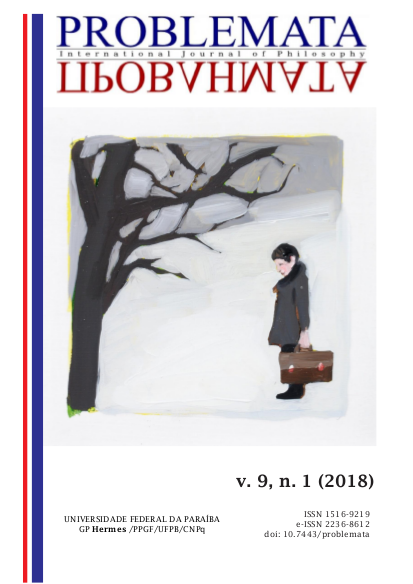FROM THE CRITICISM OF THE PRESENT TO THE POSSIBILITIES IN HISTORY: ABOUT THE ONTOLOGY OF THE NON-ENCORE-ETRE IN ERNST BLOCH'S THOUGHT
DOI:
https://doi.org/10.7443/problemata.v9i1.38720Keywords:
Utopia, Ontology and Marxism, Possibility.Abstract
Ernst Bloch's The Principle Hope [de Prinzip Hoffnung] (1954-1959) in the context of the twentieth century emerges as a theoretical work not interior of the Marxist tradition whose central objective is an interpretation and update of the utopias that mark the history of culture: an inheritance intact. As a work of historical memory, such a thought refuses to play such as is what is forgetfulness. However, in different categories of argument, a denial of all extreme pessimism as to the possibilities for historical transformation - and which is current to the concept of utopia - lies in the theorizing of what the author calls the ontology of the still-not-being, that is , from a philosophical debate about external reality. In his most important work - text that enters into the index of Marxist orthodoxy - a constant passage from anthropology and psychology to ontology is observed, so as to think of the being of subjectivity as much as it is of the work, as well as the dialectical relations between them. In this hermeneutics of utopias we see a reflection arise in which the philosophical primacy is not the being, but the still-not-being. From this perspective, we may think that Ernst Bloch's philosophy is utopian as a theory of the still-non-existent being. An ontology of the still non-being, object of the present reflection, is presented as one of the central themes in The Hope Principle.Downloads
References
BICCA, Luiz. Marxismo e liberdade. São Paulo: Loyola, 1987.
BLOCH, Ernst. El pensamiento de Hegel. Tradução espanhola de Wenceslao Roces. Mexico; Buenos Aires: Fondo de Cultura Económica, 1963.
______. Thomas Münzer, Teólogo da Revolução. Trad. br. Vamireh Chacon e Celeste Aída Galeão. Rio de Janeiro: Tempo Brasileiro, 1973.
______. L’Esprit de l’utopie [1918-1923]. Trad. fr. de Anne Marie Lang e Catherine Tiron-Audard. Paris: Gallimard, 1977.
______. Héritage de ce temps. Trad. fr. de Jean Lacoste. Paris: Payot, 1978.
______. Il Principio Speranza. Trad. it. Enrico d’angelis e Tomaso Cavallo; Int. Remo Bodei . Milano: Garzanti, 2005.
______. O Princípio Esperança [1954-1959]. Vol. I. Trad. br. Nélio Schneider. Rio de Janeiro: EdUERJ; Contraponto, 2005.
______. O Princípio Esperança [1954-1959]. Vol. II. Trad. br. Werner Fuchs. Rio de Janeiro: EdUERJ; Contraponto, 2006.
BLOCH, Ernst. Avicenne et la gauche aristotélicienne. Trad. do alemão para o francês por Claude Maillard. Éditions Premières Pierres: Paris, 2008.
BOURETZ, Pierre. Testemunhas do futuro: filosofia e messianismo. Tradução de J. Guinsburg
et all. São Paulo: Perspectiva, 2011.
HABERMAS, Jürgen. Ernst Bloch: um Schelling marxista. In: Habermas. Trad. e org. Bárbara Freitag e Sérgio Paulo Rouanet. Editora Ática: São Paulo, 1993.
HURBON, Laennec. Ernst Bloch. Utopie et Esperance. Paris: Les Éditions du CERF, 1974.
KOSELLECK, Reinhart. Futuro Passado: Contribuição à semântica dos tempos históricos. Trad. de Wilma Patrícia Maas e Carlos Almeida Pereira. Rio de Janeiro: Contraponto, 2006.
LEVI, Primo. Os afogados e os sobreviventes. Trad. br. de Luiz Sérgio Henriques. São Paulo: Paz e Terra, 2004.
LÖWY, Michael. Utopia y romanticismo revolucionario en Ernst Bloch. In: Ernst Bloch: Tendencias y latencias de un pensamiento. Org. Miguel Vedda. Buenos Aires: Hermienta, 2007.
MACHADO, Carlos Eduardo Jordão. Um capítulo da história da modernidade estética: debate sobre o expressionismo. São Paulo: UNESP, 1998.
MÜNSTER, Arno. Ernst Bloch: filosofia da práxis e utopia concreta. São Paulo: UNESP, 1993.
______. L’ Utopie concrète d’Ernst Bloch: Une biografie. Prefácio de André Tosel. Éditions Kimé: Paris, 2001.
______. Utopia, messianismo e apocalipse nas primeiras obras de Ernst Bloch. Trad. de Flávio Beno Siebeneichler. São Paulo: Editora da Universidade Estadual Paulista, 1997.
ZECCHI, Stefano. Ernest Bloch: Utopia y Esperanza en el Comunismo [1974]. Trad. esp. Enric Pérez Nadal, Barcellona: Península, 1978.
PALMIER, Jean-Michel. En relisant “L’Esprit de L’Utopie” ou prière pour un bon usage d’ Ernst Bloch. In: Réification et utopie: Ernst Bloch et Georg Lukács, un siècle après. Paris: Actes du Colloque Goethe Institut, 1985.
RAULET, Gerard (Org.). Utopie Marxisme selon Ernst Bloch: un siècle après. Payot: Paris, 1976.
VIEIRA, Antonio Rufino. Marxismo e libertação: estudos sobre Ernst Bloch e Enrique Dussel. São Leopoldo: Nova Harmonia, 2010.
ZECCHI, Stefano. Ernest Bloch: Utopia y Esperanza en el Comunismo [1974]. Trad. esp. Enric Pérez Nadal, Barcellona: Península, 1978.
Downloads
Published
Issue
Section
License
Authors who publish with this journal agree to the following terms:
- Authors retain copyright and grant the journal right of first publication with the work simultaneously licensed under a Creative Commons Attribution License that allows others to share the work with an acknowledgement of the work's authorship and initial publication in this journal.
- Authors are able to enter into separate, additional contractual arrangements for the non-exclusive distribution of the journal's published version of the work (e.g., post it to an institutional repository or publish it in a book), with an acknowledgement of its initial publication in this journal.
-
- Authors are permitted and encouraged to post their work online (e.g., in institutional repositories or on their website) prior to and during the submission process, as it can lead to productive exchanges, as well as earlier and greater citation of published work (See The Effect of Open Access).





